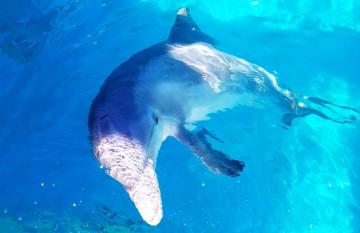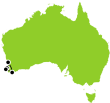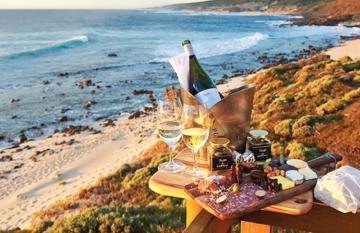
Would you like to come face-to-face with the world’s happiest animal, while on your Aussie vacation travel experience?
The wildlife-loving First Light Travel gurus give the lowdown on how to see the delightful Quokka - Western Australia’s favourite native furry attraction.
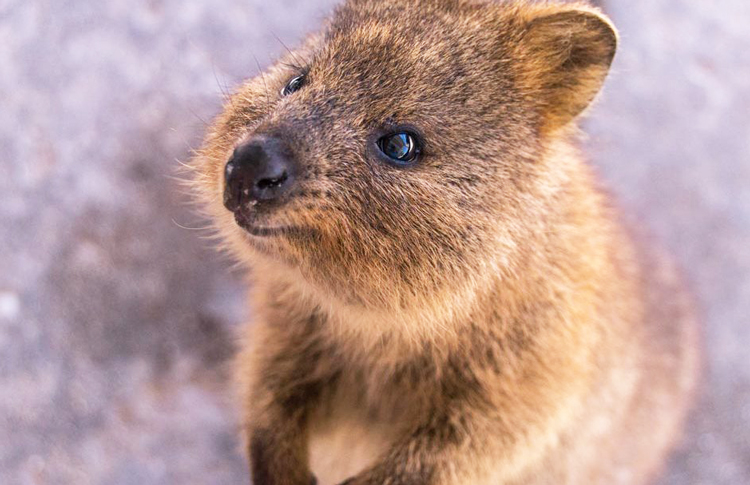
Contents
Meet the World's Happiest Animal in Western Australia...
Unless you have been living under a rock you are very likely to have come across the delightful face of Australia’s Quokka (pronounced “kwaa-ka”), an animal that has been dubbed the world's happiest and taken social media by storm in recent years. In fact, search for #quokkaselfie online and you will find thousands of grinning Quokka faces (along with a few celebrities) that will put a smile on your own face. The small land mammal is only found in certain areas of Western Australia, including Rottnest Island which is home to the healthiest of its population. Under careful guidelines, we have compiled the best way to see them along with some other fascinating tidbits.
Read on for your Quokka fix:
Where can I go to see a Quokka?
The world’s Quokka population can only be found in certain areas in the south-east mainland of Western Australia, plus a few thousand on Bald Island off the southern coast. However, the majority of the communities are native to Rottnest Island, a tropical landmass surrounded by coral reefs located west of Perth. Quokkas cannot be found in captivity anywhere outside of Australia so you need to visit their native country for a chance to come across one and, due to the high population density, Rottnest Island is the best place to seek out the charming animal.
Rottnest Island, or ‘Rotto” as the locals call it, is accessible via a short ferry ride from Perth or Fremantle. Once on Rotto, our hot tips for the perfect Quokka-spotting locations are to head to the Thomson Bay Settlement or the area around Wadjemup Lighthouse.
Fun fact: Quokkas are members of the macropod family (herbivorous pouched marsupials) - a relation of wallabies, kangaroos and pademelons.
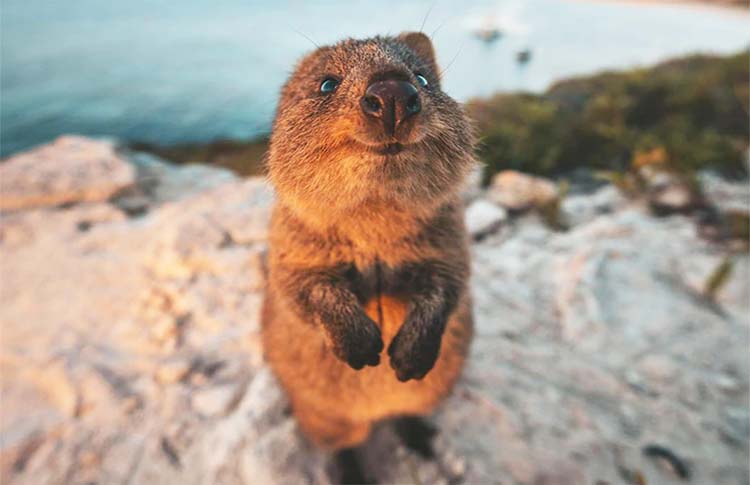
When can you see Quokkas?
Quokkas are nocturnal and mainly spend their days sleeping and avoiding the hot sun, venturing out after dark in search of food. So, your best chance to catch a glimpse of them is to venture out in the early morning or late afternoon/early evening.
The animal’s breeding season is generally considered to be from January to August (peaking between January and March), therefore, visiting during this period increases the opportunities to see baby Quokkas. The temperatures are generally cooler and more favourable during this season so it is an excellent time for a trip.
Fun fact: Just like kangaroos, wombats, wallabies, possums, koalas and other marsupials, Quokkas have abdominal pouches in which to keep their babies (also known as Joeys).
How do you attract a quokka?
There is no need to attract a Quokka as they will generally come to you (on their own terms and as long as they do not feel threatened). These are wild animals so be mindful to be respectful of their environment and give them their space. Never feed any wild animals, especially Quokkas, as this can be dangerous to their health since their bodies are not used to artificial ingredients or unusual foods so their diets could be severely disrupted if given anything not native to their environment.
It is important to note that it is illegal to feed or pet a Quokka and this can result in hefty fines, so all the more reason to keep your distance and admire the creatures from afar.
Try these tips to increase the chance of seeing a Quokka on Rottnest Island:
- Seek them in their usual homes - usually in grassy and shady sheltered areas where they feel safe and comfortable.
- Be quiet - although they are generally very friendly and used to humans, Quokkas can be easily spooked so best to be quiet and gentle with your movements around them. Give them space and if they decide to come closer to you then enjoy the moment but if they do not, leave them be.
- Look down and up - Quokkas like to hide down low in the bushy areas but can also scale trees for food so make sure to look up and you might catch a glimpse of one in search of dinner.
- Observe and take your time to see how a Quokka reacts to your presence - if they seem interested in you then most likely they will come to you or you might be able to get a little closer. If they seem nervous or stressed then best to move on to avoid frightening them or risk them attacking you.
Fun fact: Quokkas were originally discovered in the 17th century by Dutch explorers who thought they were large rats and christened their island "Rotte nest" or "rat's nest."
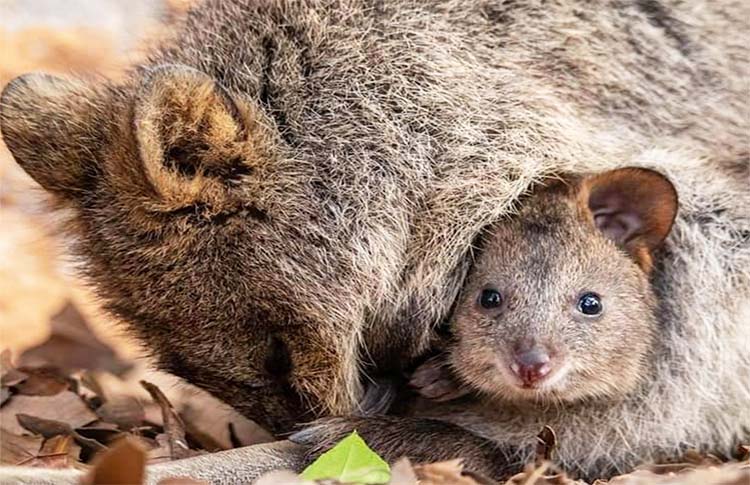
How do you get a quokka selfie?
Follow our tips above for seeing a Quokka and, once you do, take your time to let them come to you for a photo - they are so friendly and used to humans that it is most likely they will approach you. Once they are close by you can snap your pic. A selfie stick is an excellent tool to help keep your distance while framing the perfect shot.
Remember, do not touch or feed a Quokka. Despite their usual calm and friendly behaviour they can still become violent if scared or threatened, so keep your movements gentle and slow and avoid loud noises that might startle them.
Fun fact: Quokkas are known to sometimes use their young as a defence mechanism, abandoning babies in front of predators in order to escape. They may not win any parenting awards for this but in the usual 10-year lifespan a Quokka can have around 15 to 17 babies.
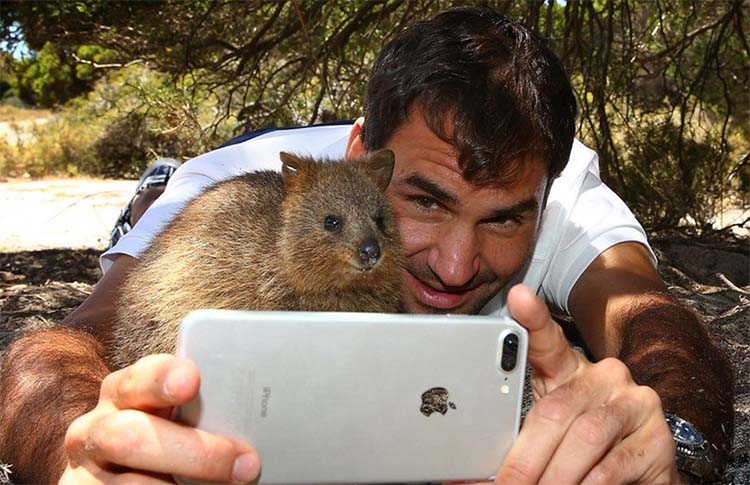
Are you allowed to touch Quokkas?
In short, no.
It is difficult to resist the cheeky and friendly nature of the Quokka, especially since they are now so used to human visitors, however, it is very important never to touch or feed them.
You are allowed to take photos (from a reasonable distance) but under the Rottnest Island Authority Act, it is illegal to pet or feed Quokkas with fines of at least $150 given on the spot. Additionally, further prosecution fines can be incurred of up to $10,000 under the Wildlife Conservation Act and even more of up to $50,000 under the animal welfare act.
Fun fact: Quokkas are about the size of an average house cat.
Are Quokkas friendly?
Quokkas are some of the world’s most curious and friendliest creatures and, since visitors to their native lands continue to increase, they are getting more used to human company. They are likely to hop right up to you if you are calm and patient. However, don’t be mistaken by their cheeky friendliness. It is important to remember that Quokkas are wild animals and if threatened or frightened, they can bite or attack with their claws and powerful back legs.
Fun fact: Quokkas are herbivores so they eat grasses, leaves, shrubs, and plants. When water and greenery are scarce they are known to munch on succulents to get their hydration fix.
Are Quokkas going extinct?
Quokkas are not going extinct per se, however, they are listed as a vulnerable species by the International Union for Conservation of Nature due to their low numbers (as few as 7,500 – 15,000 mature individual Quokkas in the wild) which are currently also decreasing.
Quokka populations are threatened by drought, disease and the destruction of their habitats through fire and land development. If you’re interested in contributing to the conservation of the Quokkas homelands on Rottnest Island we recommend finding out more with the Rottnest Foundation.
Fun fact: Quokkas can go for months without water and they store a huge amount of reserve body fat in their tails to keep them going when food and water are scarce.
What does Quokka mean in Aboriginal?
The meaning of the word is ambiguous but ‘Quokka’ derives from the indigenous name ‘Gwaga’ given to the animal by the Aboriginal Noongar people of southwest Western Australia.
Fun fact: the Quokkas scientific name is Setonix brachyurus and they are also known as the short-tailed scrub wallaby.
Are Quokkas actually happy?
It is fun to think that these animals constantly have an endearing grin on their furry faces but it is thought that their smiling mouth shape has developed as an evolutionary feature to help keep them cool. Their sunshine drenched habitats of Australia means they have developed a wide smile to help them pant to cool off. Still, they lead a pretty idyllic lifestyle on the beautiful Rottnest island and they certainly are photogenic so enjoy the smiles when you visit.
Fun Fact: Since rabbits are thought of as pests in Australia, you may come across the alternative of chocolate Quokkas at Easter! Proceeds from sales of the Margaret River Chocolate Company’s ‘Chokka the Quokka’ go towards the animal conservation projects on Rottnest Island.
Ready to come face-to-face with a Quokka? We would love to provide the introductions!
Check out our Western Australia itineraries that include a visit to Rottnest Island. Or, if you’re keen to create your own self-drive itinerary then simply chat to our First Light Travel specialists about our bespoke packages.
Recent Posts
Blog Categories
Blog archives
- March 2025 (1)
- November 2024 (1)
- October 2024 (1)
- September 2024 (8)
- June 2024 (4)
- May 2024 (2)
- April 2024 (2)
- March 2024 (13)
- February 2024 (3)
- January 2024 (5)
- December 2023 (6)
- November 2023 (4)
- October 2023 (11)
- September 2023 (2)
- August 2023 (6)
- July 2023 (2)
- June 2023 (17)
- May 2023 (3)
- April 2023 (5)
- March 2023 (8)
- February 2023 (9)
- January 2023 (12)
- December 2022 (9)
- November 2022 (12)
- October 2022 (12)
- September 2022 (12)
- August 2022 (6)
- July 2022 (9)
- June 2022 (7)
- May 2022 (3)
- April 2022 (4)
- March 2022 (6)
- February 2022 (1)
- January 2022 (4)
- December 2021 (2)
- November 2021 (3)
- October 2021 (1)
- September 2021 (4)
- August 2021 (10)
- July 2021 (13)
- June 2021 (6)
- April 2021 (2)
- March 2021 (2)
- February 2021 (1)
- January 2021 (1)
- December 2020 (2)
- November 2020 (3)
- October 2020 (2)
- September 2020 (1)
- August 2020 (1)
- July 2020 (1)
- June 2020 (1)
- May 2020 (1)
- March 2020 (1)
- February 2020 (2)
- January 2020 (4)
- December 2019 (2)
- November 2019 (1)
- October 2019 (1)
- September 2019 (5)
- August 2019 (1)
- July 2019 (5)
- June 2019 (1)
- May 2019 (1)
- April 2019 (1)
- March 2019 (1)
- February 2019 (1)
- January 2019 (1)
- December 2018 (1)
- October 2018 (1)
- May 2018 (1)
- February 2018 (1)
- December 2017 (1)
- October 2017 (1)
- June 2017 (1)
- May 2017 (1)
- February 2017 (1)
- January 2017 (1)
- September 2016 (1)
- August 2016 (2)
- July 2016 (1)
- June 2016 (1)
- May 2016 (1)
- April 2016 (1)
- December 2015 (1)




